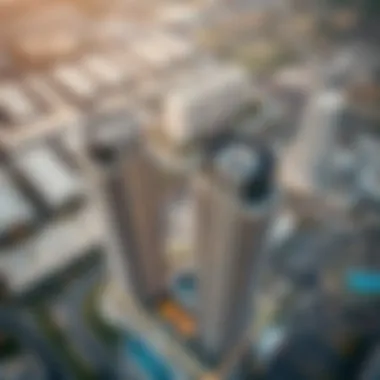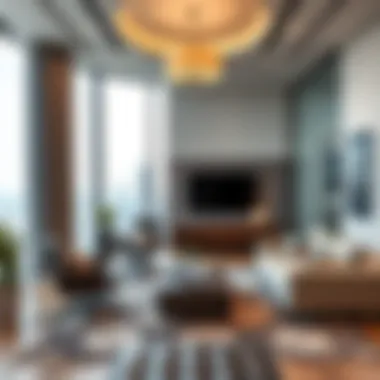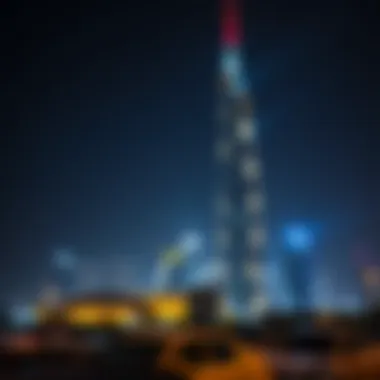Understanding B2B Towers in Dubai's Real Estate Market


Intro
In the ever-evolving real estate landscape of Dubai, the concept of B2B towers has emerged as a vital niche. These towering structures are more than just glass and steel; they symbolize a thriving business ecosystem that captures the essence of commerce in one of the world’s leading cities. B2B towers cater primarily to businesses, offering a venue for office spaces, conference facilities, and collaborative environments that stimulate growth and innovation. The significance of these towers goes far beyond their architectural grandeur, deeply intertwining with Dubai’s economic framework and its ambitious vision for the future.
This article aims to peel back the layers surrounding B2B towers, examining their architectural relevance, economic implications, and the shifting market dynamics which shape them. By delving into market trends, property types, and investment opportunities, we hope to provide a clear picture of how B2B towers are sculpting Dubai's property market and influencing local and foreign investments alike.
Whether you are an investor eyeing potential properties, a home buyer looking to understand your options in the commercial real estate scene, or a lunatic property manager assessing the best spaces for your clients, the discourse on B2B towers provides insights that are both profound and practical. Without further ado, let's dive into the market trends that map the course for these unique structures.
Prologue to B2B Towers
In the intricate tapestry of Dubai's real estate landscape, B2B towers have carved out a significant niche, positioning themselves as crucial facilitators of business interactions. Understanding the architecture and purpose behind these towers is key for investors, home buyers, and anyone looking to navigate the bustling commercial market in this vibrant city. This section aims to shed light on what B2B towers are, explore their recent emergence, and paint a clear picture of the benefits they provide to businesses and the overall economy.
Defining B2B Towers
B2B towers refer to buildings specifically designed to accommodate business-to-business interactions. Unlike traditional office spaces, these towers embody a multifaceted approach that combines office suites, meeting rooms, and communal areas to foster collaboration among various companies. ~The structural design promotes networking opportunities, making these towers hubs of commercial activity. They often feature high-tech facilities, modern architectural designs, and seamless connectivity to other parts of the city, catering to the growing needs of businesses looking to thrive in Dubai.
B2B structures are essentially designed to house a variety of services, including:
- Office spaces for startups: Small businesses that require a professional setting without the overhead of managing an entire building.
- Meeting spaces for collaborations: Areas designed for organizations to meet and discuss potential partnerships or agreements.
- Support services: Amenities like printing, catering, and technological support that help businesses run smoothly and efficiently.
The uniqueness of B2B towers lies in their ability to create an environment that encourages dialogue and innovation, breaking down barriers between different companies and paving the way for synergistic relationships.
The Emergence of B2B Structures
In recent years, the proliferation of B2B towers in Dubai can be linked back to the emirate's ambitious push towards establishing itself as a global business hub. As more international companies expand their footprint in the region, the demand for dedicated spaces catering to business-to-business interactions has surged. This emergence reflects the shifting dynamics in commercial real estate, where traditional office formats fall short in meeting the evolving needs of modern enterprises.
Moreover, the government of Dubai has significantly invested in creating an ecosystem that supports innovation, elevating the importance of B2B structures.
- Increased Networking Events: With the rise of B2B towers, companies have more opportunities to attend events, meet potential clients, and engage in knowledge sharing.
- Strategic Location: Many towers are situated in economically vital areas, providing easy access for businesses and their clients.
- Adaptability to Trends: These structures are designed with flexibility in mind, allowing businesses to scale up or down as required.
The surge of B2B towers symbolizes not just a response to the immediate needs of businesses but also a strategic move toward positioning Dubai as a leading player in global commerce. The features and concepts behind B2B towers set them apart, and recognizing this emergence is paramount for anyone looking to invest in Dubai's real estate market.
"B2B towers are not just buildings; they are the pulse of modern business in Dubai, encouraging innovation and collaboration."
Importance of B2B Towers in Dubai
The significance of B2B towers in Dubai cannot be overstated. These structures are not merely concentrated hubs of business, but integral gears in the vast machinery of Dubai's economy. As the market evolves, B2B towers play a pivotal role in shaping interactions and fostering growth.
Facilitating Business Interactions
B2B towers serve as vital conduits for professional exchanges. With skyscrapers dotting the skyline, they offer an inviting atmosphere where enterprise meets enterprise. Businesses often need to collaborate, whether for partnerships, trade shows, or networking events. The design and layout of these towers are tailor-made to facilitate such interactions, featuring shared conference rooms and meeting spaces. This means businesses can not only work in proximity but also engage fluidly without the hassle of long commutes.
A wealth of businesses, from startups to established corporations, resides in these towers. For instance, a tech startup situated in the heart of Business Bay could effortlessly coordinate with an established financial institution residing on the same floor. This synergy simplifies processes and encourages innovation. The ease of interaction is a cornerstone of a thriving business ecosystem, making B2B towers indispensable in daily operations.
Supporting Economic Growth
B2B towers embody more than just architectural marvels; they are catalysts for economic expansion. Their existence generates opportunities—not just for the companies within, but for the surrounding communities as well. The increased activity leads to job creations, with a multitude of roles from administrative staff to facilities management positions. This economic dynamism promotes a ripple effect that fuels the local economy.
In addition, these towers often stimulate ancillary markets. Retail outlets, dining options, and support services evolve around B2B hubs. This interconnected ecosystem enhances the attractiveness of Dubai as a global business destination. Investors looking at B2B towers see not just the physical asset, but the myriad of economic possibilities unfolding around them.
With the rapid pace at which these towers are evolving, they ensure that Dubai remains competitive in the global market, continuously attracting foreign investment. In essence, B2B towers are not isolated structures; they represent building blocks in Dubai's broader ambitions for sustained economic prosperity and innovation.
In essence, B2B towers stand as a testament to Dubai's commitment to fostering a vibrant business landscape, blending architectural excellence with economic pragmatism.
As they rise into the sky, their significance only deepens, reflecting the ongoing journey of Dubai as a global business hub.
Key Features of B2B Towers
B2B towers represent a unique fusion of modern architecture and smart technology, embodying the spirit of Dubai's ambitious real estate market. These structures aren’t just places where business gets done; they are designed with specific features that cater to the evolving needs of companies and their workforce. Understanding the key features of B2B towers is essential for anyone looking to invest in or utilize commercial spaces in this vibrant city.


Architectural Design and Layout
The architectural design of B2B towers in Dubai is more than just aesthetic appeal; it’s about functionality and representation of the businesses they house. Architects have to ensure maximum usability while keeping the building visually appealing. Many of these towers boast open floor plans, which are designed to encourage collaboration, while also ensuring that individual workspaces are available for privacy.
- Use of Glass and Natural Light: Wide glass panels are a hallmark of many B2B towers, bringing in abundant natural light. This decreases reliance on artificial lighting, creating an inviting atmosphere.
- Distinctive Facades: Often inspired by Dubai’s cultural heritage, the facades of these towers provide a blend of tradition and modernity, elevating the skyline.
- Flexible Spaces: Considerations for varying business sizes and their needs results in spaces that can be easily adapted over time. The ability for tenants to customize their area enhances tenant satisfaction and retention.
The layout of today's B2B towers reflects a shift towards community-oriented designs that foster networking opportunities among tenants, creating a bustling hive of activity, ideal for business interactions.
Technological Advancements
In this digital age, technology is the backbone of B2B towers. Many new developments incorporate smart technologies that not only enhance the operational efficiency of businesses but also improve the experience for employees and clients alike.
- Smart HVAC Systems: Automated heating, ventilation, and air conditioning systems help maintain comfort while optimizing energy usage.
- High-Speed Connectivity: With businesses more connected than ever, many B2B towers offer fiber-optic internet connection. This ensures firms can communicate effectively and remain competitive.
- Integrated Security Solutions: Advanced security systems, including surveillance cameras and access control, protect valuable assets and promote a safe working environment.
These technological features not only streamline operations but also attract tech-focused enterprises eager to retain a competitive edge in their industries.
Amenities for Businesses
Amenities are crucial in making B2B towers appealing to businesses seeking a location to thrive. When it comes to amenities, modern B2B towers often have an array of offerings designed to enhance the overall experience for tenants and their employees.
- Meeting Rooms and Conference Facilities: Many B2B towers come equipped with well-appointed conference rooms that allow companies to host meetings without the need for off-site rentals.
- Fitness Centers and Recreational Spaces: To promote a healthy work-life balance, facilities such as gyms and lounges have become common. This not only improves employee satisfaction but can also aid in recruitment.
- Food and Beverage Options: On-site cafes, restaurants, and snack bars are highly valued. They provide convenience and promote interactions in a casual atmosphere.
- Parking and Transportation Access: Ample parking spaces and proximity to public transport hubs is critical in attracting businesses. Easy accessibility helps ensure that employees and clients can reach the building with minimum hassle.
These amenities serve to enhance the lifestyle of those who work within the towers, reinforcing the idea that these spaces are more than just places of work—they are ecosystems designed for growth.
"Investing in B2B towers means embracing a vision of collaboration, innovation, and the future of commerce."
In sum, the key features of B2B towers encapsulate their architectural significance, technological integration, and the thoughtful amenities provided to businesses. They are a critical component in Dubai's dynamic real estate landscape, representing not just buildings, but thriving communities designed for the modern marketplace.
Current Market Trends
Understanding the current market trends surrounding B2B towers in Dubai's real estate landscape is crucial for anyone involved in property, whether they are investors, home buyers, or real estate agents. The trend analysis not only highlights shifts within the real estate market but also emphasizes the broader economic implications these changes may have. B2B towers are pivotal in supporting business activities and adapting to the ever-changing environment of global commerce.
Demand for B2B Towers
The demand for B2B towers reflects a dynamic fusion of economic growth and urban development. Several factors contribute to this demand:
- Strategic Location: Many businesses seek spaces in B2B towers that are centralized and easily accessible, often located near transport hubs or commercial districts. Places like the Dubai International Financial Centre (DIFC) and Business Bay stand out for this reason.
- Modern Facilities: Businesses now prioritize modern amenities such as advanced conference rooms, high-speed internet, and integrated technologies. B2B towers designed with these features tend to attract more tenants, signaling a strong demand.
- Local and Global Investments: As Dubai continues to position itself as a global business hub, local and international companies are eager to establish a presence within the emirate. This has spurred increased interest in leasing or purchasing office spaces within vertical towers dedicated to business functions.
The demand is therefore not just a reflection of current business needs, but also an indicator of future economic trends in the region.
Investor Sentiment
Understanding investor sentiment toward B2B towers is equally significant. Factors influencing this sentiment include:
- Market Stability: With Dubai’s real estate market usually resilient to global economic fluctuations, investor confidence tends to stay strong. This stability attracts foreign investments, amplifying interest in B2B towers.
- Potential Returns: Investors look closely at the potential rental yields and capital appreciation that B2B towers may offer. Many B2B structures promise favorable returns due to high occupancy rates and demand from businesses.
- Government Support: The regulatory environment in Dubai, characterized by business-friendly policies and incentives, often leads to a positive investor outlook.
Moreover, sentiments can shift quickly based on economic signals. Those keen on investing in B2B towers must stay attentive to market fluctuations and adapt their strategies accordingly.
Competitive Landscape
The competitive landscape of B2B towers is becoming increasingly intricate, influenced by several factors:
- Emergence of New Players: Many real estate developers are entering the B2B market, leading to a more competitive environment. This often accelerates innovation and efficiency in design and services provided within these towers.
- Variety of Offerings: With a surge in B2B towers, businesses have more choices. This variety forces existing towers to enhance their offerings, whether through improved facilities or additional services like networking events and shared spaces.
- Sustainability Focus: There is a growing emphasis on sustainable development. New constructions are increasingly incorporating green technologies, which can give certain towers a competitive edge.
The competition drives the market, making it essential for towers to not only meet current demands but anticipate future trends. Staying aware of these competitive aspects will be key for anyone looking to engage with B2B towers in Dubai.
"Understanding the pulse of the market is as critical as the structure itself when it comes to B2B towers. Investors and businesses should always look beyond just the bricks and mortar."
For more on the real estate market trends, check resources such as Wikipedia or Britannica.


Investment Opportunities
Investment in B2B towers is not just a contemporary trend; it is rapidly becoming a cornerstone of Dubai's real estate landscape. These structures provide more than just office space; they symbolize a robust economic environment that attracts both local and international investors. Understanding the nuances of investment opportunities in B2B towers is vital for anyone looking to capitalize on the evolving commercial real estate sector in Dubai.
B2B towers are designed to streamline business interactions while providing a conducive atmosphere for growth. With high demand for state-of-the-art facilities, investing in such properties often leads to handsome returns, especially for those who are astute in their choices. The demand for innovative office spaces—ones that offer flexibility and modern conveniences—supports the notion that B2B towers are a sound investment.
Profitability of B2B Towers
The profitability of B2B towers hinges on several interlinked factors. First, consider the occupancy rates. High occupancy is essential; a well-occupied tower not only pays for its operational costs but also ensures profits for the stakeholders involved.
Another important element is rental yield. B2B towers generally command higher rental prices compared to traditional offices due to their strategic locations, cutting-edge designs, and amenities tailored to corporate needs. According to industry reports, prime B2B towers can yield rental returns of 8-10% annually, a significant figure compared to other investment options.
Moreover, with an ever-growing population and a steady influx of foreign enterprises, the demand for commercial space in Dubai continues to rise. Investors can foresee good returns, fueled by an increasing number of startups and established businesses seeking modern accommodations.
"Investing in B2B towers is not solely about present yields; it is also about position for future growth in a marketplace that constantly evolves."
Identifying Prime Locations
When it comes to investment in B2B towers, location is the name of the game. Not all towers are created equal, and some locations within Dubai have proven to be more lucrative than others.
Top considerations when identifying prime locations include:
- Proximity to business districts: Areas close to key commercial hubs like Dubai International Financial Centre (DIFC) or Dubai Internet City generally draw higher demand.
- Accessibility: Easy access to transport links, including metro stations and major highways, enhances the attractiveness of any B2B tower.
- Emerging neighborhoods: Locations on the verge of development often provide better opportunities for growth. Areas like Dubai South have been mentioned as benefitting from future government and infrastructure projects.
- Regulatory environment: Understanding local regulations that affect property investment is key. Some areas may offer favorable conditions that enhance value.
Investors should keep their eyes peeled for changes in zoning laws, upcoming infrastructure projects, and shifts in business trends which can all significantly influence property values. Monitoring these factors can ensure that one is poised to act swiftly when opportunities arise.
In summary, the investment opportunities presented by B2B towers in Dubai are vast and varied. Not only can they provide substantial returns through rental income and appreciation but also symbolize a forward-thinking approach in real estate investment. By understanding profitability measures and identifying strategic locations, potential stakeholders can effectively navigate this dynamic market.
Navigating Legal Considerations
Legal considerations are a cornerstone of making informed decisions within the realm of B2B towers in Dubai. This section delves into the regulatory landscape and legal frameworks that potential investors must navigate to ensure compliance, mitigate risks, and take full advantage of emerging opportunities. As Dubai continues to grow as a global business hub, understanding these aspects becomes not only beneficial but essential for anyone involved in the real estate market.
Regulations Governing B2B Towers
The regulatory environment surrounding B2B towers in Dubai is intricate and layered. Central to this is the concept of zoning and land use regulations, which define how properties can be utilized. The Dubai Land Department plays a pivotal role in regulating property ownership, ensuring all developments align with local laws and standards.
Among the significant regulations are:
- Ownership Norms: In Dubai, foreign investors can own property under certain conditions, though freehold ownership is generally limited to designated areas.
- Building Codes: Compliance with safety codes is mandatory, covering everything from construction materials to emergency exit strategies.
- Environmental Standards: New developments must adhere to environmental regulations, reflecting a growing emphasis on sustainable practices.
Navigating these regulations requires acute attention to detail to avoid pitfalls such as fines or legal disputes. Overall, staying abreast of these rules is crucial, as they can significantly affect the viability and profitability of a B2B tower investment.
Legal Framework for Investors
For investors eyeing B2B towers, a solid grasp of the legal framework is indispensable. This framework not only aids in understanding ownership rights but also encompasses contracts, dispute resolution mechanisms, and due diligence processes.
Key elements include:
- Contract Law: Real estate transactions are guided by stringent contracts that outline obligations, rights, and recourse in case of non-compliance. Investors must ensure that contracts are comprehensive and legally binding to safeguard their investments.
- Dispute Resolution: The UAE offers multiple avenues for resolving real estate disputes, ranging from traditional court systems to arbitration, which is often favored for its efficiency.
- Due Diligence Process: Conducting thorough due diligence can reveal potential issues with property titles, liens, or ongoing litigation that could affect the investment's worth. This process often involves consulting legal experts to validate documents and verify compliance with local laws.
In summary, the legal considerations related to B2B towers in Dubai are multifaceted and necessitate attention from investors. A proactive approach to understanding both regulations and the governing legal framework can not only help avoid legal missteps but also enhance overall investment strategies.
"Knowledge of legal frameworks and regulations is as valuable as the buildings themselves; they are the bedrock of successful investment in Dubai's dynamic real estate market."
For further insights on regulations and legal aspects, you may refer to resources such as Dubai Land Department or Government of Dubai.
The Future of B2B Towers
The vision for B2B Towers in Dubai’s skyline is not just about creating taller and flashier buildings, but rather, it’s a reflection of evolving business needs and environmental awareness. With the global marketplace intertwining more closely with technology and sustainability, the future of B2B towers will hinge significantly on these elements. This section delves into what lies ahead, touching on development trends and the vital role of sustainable architecture.


Predictions on Development Trends
As the real estate landscape shifts, B2B towers will continue to adapt accordingly. Among the most telling trends is the increase in mixed-use spaces that cater to businesses while providing amenities for employees. In a bustling city like Dubai, blending living, working, and recreational areas in one locale not only saves time but also fosters a sense of community.
- Flexible Workspaces: The rise of remote working has paved the way for more flexible office configurations. Developers are increasingly inclined to design spaces that can be easily adjusted to meet changing demands of businesses, making them versatile in use.
- Increased Use of Smart Technologies: From IoT devices to AI-driven systems, the incorporation of technology will be dominant in new B2B towers. Facilities that efficiently manage energy use or optimize space for different activities will create competitive advantages for tenants.
- Focus on Wellness: Post-pandemic concerns have placed health and wellness at the forefront. The design will increasingly feature elements that promote wellbeing and productivity, such as ample natural light, green areas, and adequate ventilation systems.
- Cultural Integration: Developers will be paying attention to integrate cultural aspects into B2B towers. This could mean art installations that resonate with the local heritage or architectural designs that reflect Dubai’s rich history while catering to a global audience.
Sustainability in B2B Architecture
Sustainability will not just be an add-on but a core principle shaping the future of B2B towers. As the world grapples with climate change, the construction and operation of these buildings will need to adhere to stricter environmental standards. Here’s how sustainability is likely to shape B2B tower development:
- Energy Efficiency: Buildings will need to meet high energy performance ratings, using renewable energy sources where possible, such as solar panels or wind energy.
- Water Conservation: Rainwater harvesting systems and efficient plumbing will be part of new designs, using water-saving fixtures and recycling wastewater for irrigation.
- Green Building Certifications: Developers aiming for certifications like LEED or BREEAM will find themselves more competitive in attracting tenants who value sustainability. This focus may facilitate higher rental rates and better occupancy rates.
- Sustainable Materials: The choice of building materials will lean towards sustainable options, such as recycled concrete or sustainably sourced wood. Ensuring the longevity and minimal environmental impact of these materials will be pivotal.
"Investment in sustainability is not just a trend; it’s a necessity for the future of urban living and working."
In summary, the journey ahead for B2B Towers in Dubai is marked by a commitment to adaptability and sustainability. By responding to market demands and environmental imperatives, they stand to redefine how businesses operate in the heart of this dynamic city.
Challenges Facing B2B Towers
The landscape of B2B towers in Dubai is vibrant yet complicated. Understanding the challenges that these structures face is essential for stakeholders, including investors, property managers, and businesses looking to occupy these spaces. As the real estate market continues to evolve, several factors can impact the viability and success of B2B towers. This section will examine two primary challenges: economic fluctuations and market saturation risks.
Economic Fluctuations
Economic stability plays a crucial role in the real estate sector, and B2B towers are no exception. When the economy experiences a downturn, businesses often tighten their belts, leading to decreased demand for commercial spaces. This drop can ripple through the B2B tower sector, affecting occupancy rates and rental prices. In moments of financial uncertainty, companies may choose to reduce office space to save costs or even shift towards remote work, which can severely undercut the need for business towers.
Moreover, with fluctuations in oil prices, which significantly affect Dubai’s economy, this sector is highly susceptible to potential downturns. For example, when oil prices collapse, investments from oil-dependent businesses wane. In response, B2B towers may struggle to attract tenants or retain existing ones.
A few considerations around economic fluctuations include:
- Impact on Lease Agreements: Companies might renegotiate or seek shorter leases during tough times, making long-term commitments challenging.
- Maintenance Costs: With economic pressures, building owners might delay maintenance or upgrades, leading to lower building appeal.
- Investment Hesitation: Investors may become wary of funding new B2B projects if the economic climate looks unstable.
"Understanding economic trends is not just about watching numbers; it's about anticipating how they affect your real estate strategies."
Market Saturation Risks
In recent years, Dubai has seen a boom in the development of B2B towers, resulting in an increasingly crowded market. When there are more towers than businesses needing space, the risk of market saturation arises. High vacancy rates can result from an oversupply, making it tough for property managers to maintain profitability.
Market saturation presses landlords to lower prices, often leading to increased competition among similar towers. This situation can dilute the brand value of properties, causing a race to the bottom where everyone is fighting for the same limited pool of businesses. Furthermore, new developments may outshine older towers, making it harder for them to attract tenants.
Key points related to market saturation include:
- Innovation: Properties without unique selling propositions may get left behind. Tower amenities or advanced technology could mean the difference in attracting tenants.
- Niche Market Attraction: B2B towers may need to focus on specific industries to build a loyal tenant base rather than casting a wide net.
- Long-Term Planning: Property owners should weigh long-term sustainability over short-term gains, ensuring their buildings remain relevant.
In sum, while B2B towers present numerous opportunities within Dubai's thriving real estate market, stakeholders must keep a close eye on economic fluctuations and market saturation. These challenges necessitate thoughtful strategies and a proactive approach to investment and development.
Ending
In the ever-evolving arena of Dubai's real estate, the significance of B2B towers cannot be overstated. These structures stand as beacons of business potential, harmonizing form and function to cater to the unique demands of the business community. With the shifting tides of market dynamics, understanding the implications surrounding B2B towers will serve investors, home buyers, real estate agents, property managers, and renters alike.
Summary of Key Insights
The exploration of B2B towers as a pivotal element in Dubai’s real estate landscape reveals several notable insights:
- Strategic Importance: B2B towers play a crucial role in facilitating seamless business interactions, creating a platform where diverse enterprises can thrive under one roof. This synergy not only fosters collaboration but also boosts local economic activities.
- Architectural Innovation: The architectural designs of these towers are not merely aesthetic choices; they reflect a commitment to advanced construction technology and sustainability, which is essential in today's eco-conscious market.
- Investment Viability: The potential for high returns makes B2B towers an attractive proposition for investors. With prime locations and booming demand, the future of B2B investments holds promise for substantial growth.
- Legal Landscape: Navigating the complexities of regulations related to B2B towers is pivotal. Investors need to be well-informed about the legal frameworks to safeguard their interests while maximizing opportunities.
Overall, every segment of the market is affected, directly or indirectly, by the trends surrounding B2B towers. Whether it's the infrastructure that supports local businesses or the economic boosts that these structures provide, the benefits are abundant and multifaceted.
The Role of B2B Towers in Shaping the Future of Dubai
As Dubai continues on its trajectory toward becoming a global business hub, B2B towers are set to play an increasingly vital role. Factors such as:
- Technological Integration: The advent of smart building technologies is transforming the functionality of commercial spaces, allowing for more productivity and efficiency. Features like IoT connectivity and energy-efficient systems are now commonplace.
- Sustainability Practices: With an eye towards future generations, the emphasis on sustainability in architecture is reshaping how B2B towers are conceived and constructed. Green building certifications are becoming a normative aspect of new developments.
- Dynamic Market Adaptations: The ability of these towers to adapt to changing business needs and market conditions ensures their relevance in an ever-competitive landscape. Flexible workspaces and multifunctional areas are gaining popularity, catering to evolving business models.
"B2B towers are not just buildings; they are instruments of economic and social prosperity, harmonizing various industries under one roof while paving the way for Dubai's dynamic future."
For professionals in the field, keeping a close eye on these developments is essential. Engaging with the right information and understanding the various layers of B2B towers will ensure that stakeholders can navigate effectively in this intricate real estate tapestry. The convergence of these towers into the broader context of Dubai's real estate ecosystem will no doubt continue to provide fresh opportunities and challenges alike.











